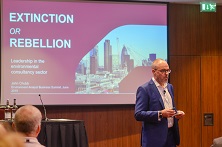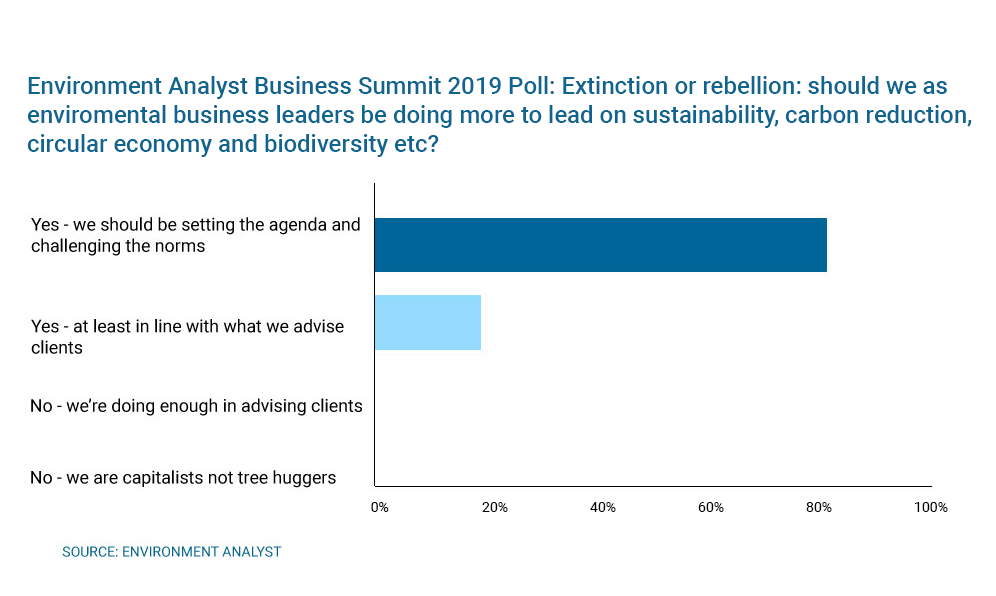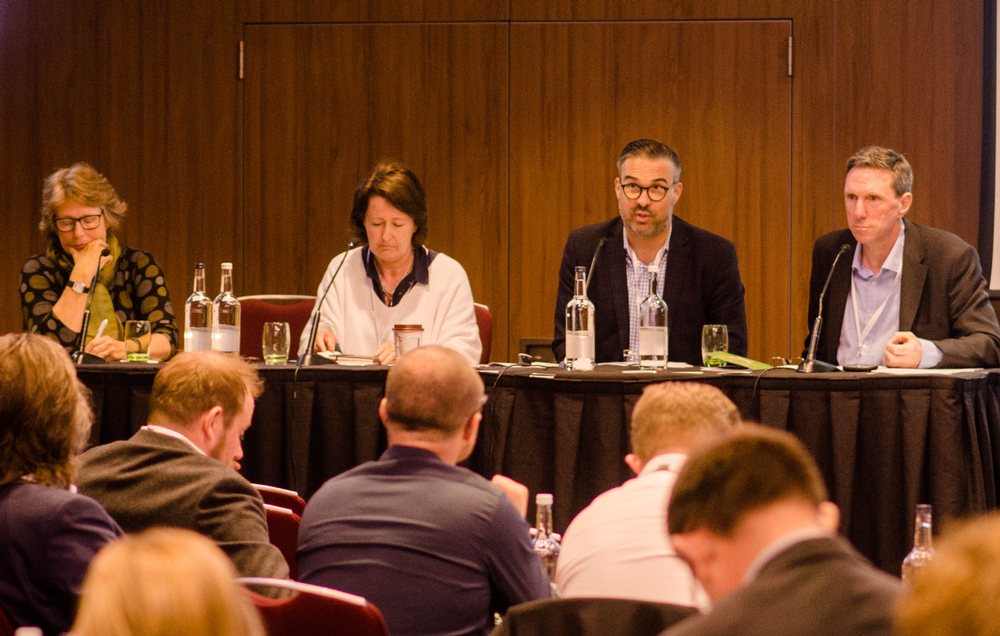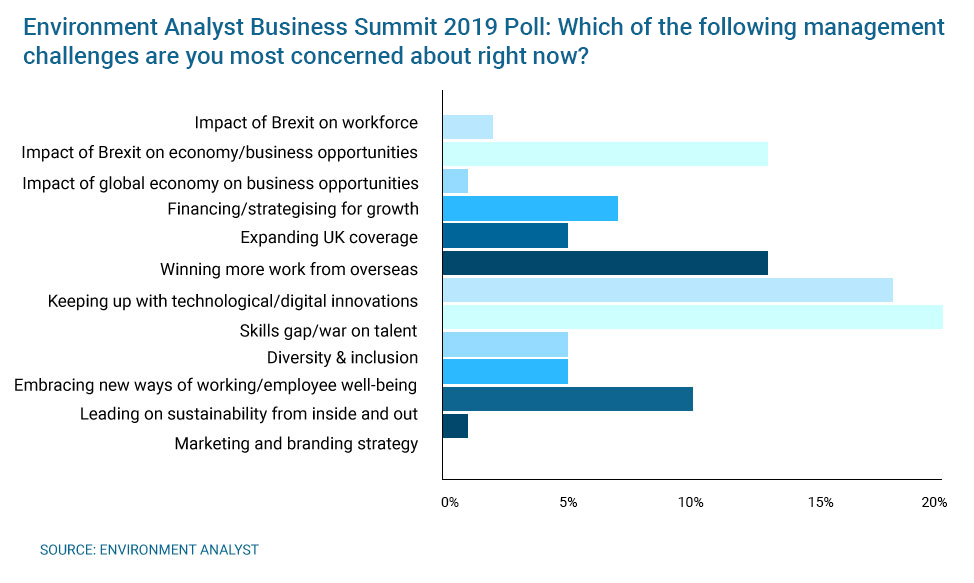
The current and future management challenges are many and varied, but there was a unifying theme which dominated discussions at this year’s Environment Analyst Business Summit held in London last week. Namely the call to arms for environmental consulting firms (and their managers and directors) to take a leadership position on climate and sustainability.
BY LIZ TREW
In his keynote speech to the 90+ CEOs, MDs and other senior executives in environmental consulting and the wider industry sector RPS chief executive officer for consulting (UK & Ireland) and the summit’s morning chair, John Chubb, laid down the challenge. He posed the question whether ‘we’ (as both human beings and environmental consultants) will be ‘extinct’ in a few years time if the sector fails to show leadership on this, or if we can ‘rebel’ and set the agenda?
Chubb suggests there are five key pressures (both internal and external) or "existential threats" potentially endangering environmental consultancy:
(i) Climate change - "The overwhelming scientific evidence from all the theories out there is this is real and if we get to that two degrees too quickly and then we’re not going to be here anymore."
(ii) Regulatory oblivion - "There are so many different rules and standards (legal, non-legal and commercial) and at a local, regional, national, trans-national and global level. [...] My contention is that as the regulatory framework gets more and more complex the lawyers will roll in their tanks because they can cut through the red tape. [...] And when they do, the role of environmental consultant will be relegated to one of assessor or verifier."
(iii) Workforce of the future - "Can we attract the workforce of the future in this increasingly connected world with a younger generation who will not want to work in offices or ‘brain factories’? [...] And maybe these environmentally-conscious people won’t want to work for us unless we show value-driven leadership."
(iv) AI, beware the robots - "As an example, RPS recently used two drones and multispectral analysis - pushing it through a convolutional neural network model using a training algorithm - to carry out an ecological characterisation of a wetlands site in Northern Ireland which was completed in 12-man days as opposed to 1000-man days if carried out by ecologists the traditional way. [...] So AI can do the job of some of our people in an absolute fraction of the time, and who knows where this will get to in another 15 years?"
(v) Consolidation and business models - "My contention here is that when you are a smaller subset of a larger multidisciplinary organisation you have a smaller voice and therefore your ability to execute leadership is somewhat less. But you can also argue that being part of a larger organisation gives you greater clout."
However, Chubb argues it is possible to ‘rebel’ against these limitations and "do more now" as per the motto of the protestors from Extinction Rebellion who recently bought London’s transport systems to a standstill and whose actions have brought about some fairly significant political actions including the Welsh government declaring a climate emergency and Prime Minister Theresa May looking to a net-zero carbon target by 2050 as her outgoing legacy. There was consensus in the room that interim milestones will need to be set - and the industry will need to get used to justifying the carbon impacts at an individual project level - in order to achieve the latter.
"There’s no way that Greta [Thunberg] can do this on her own, the politicians have woken up and they’re lumbering through with their regulatory responses. But there’s a void of leadership in this particular debate and I think maybe now it’s our time. I believe that as environmental consultants we have an awareness of the issues, we have the skills, we have the competence, we have the insights to be able to understand what those problems are and propose solutions to our clients."
And as Matthew Farrow, executive director of the Environmental Industries Commission (EIC), acknowledged later in the day, "Brexit could be a catalyst for radical environmental policies," and herein lies further opportunity for the EC sector to get involved and push the agenda forward.
Chubb’s sentiments on the ‘existential threat’ facing the sector were also echoed by Environment Analyst’s own Anya Hembrough in her summary of the state of the global environmental consulting industry. "The wider market conditions may finally be picking up, but never has the competition been fiercer. And on that backdrop, the industry is facing something of an existential crisis. The boundaries between the differing consulting disciplines continue to blur: can you offer environmental consultancy without sustainability? Where does ESG fit in? Is it enough to just be an environmental consultant any more?
"And in the wider societal debate around environmental responsibility, where does environmental consultancy fit in as a business?" she asks.
How can the sector show leadership?
Chubb laid out a stark set of "choices" as he sees them facing environmental consultancies whom he suggests will need to live and breathe the sustainability agenda in order to get to a leadership position and in order not be accused of being hypocrites. "Maybe we choose where we work, how we work and who we work for…the consensus is that oil companies will be uninvestable in ten years’ time. That means they are rebadging and moving their interests from hydrocarbons to renewable energy.
"But they need help in doing that, in how to position and how to select the right projects and in understanding the impacts of the things they do as they make that transition. We can help them but we can also make demands and this is where we can really show leadership."
He believes the environmental consultants are uniquely equipped to be able to put demands on to their clients in heavy-impact sectors such as hydrocarbons and aviation and aptly communicate the long-term benefits. As André-Martin Bouchard, global director of environment & resources at WSP later pointed out, if environmental consultants don’t take up a leadership stance with their clients the Big Four management consultants would be delighted to step into the space - as would perhaps the lawyers - and "maybe they won’t do such a good job".
In a Q&A session Nigel Clark from SLR Consulting sounded another cautionary note, asking whether it is possible for environmental consultants to advise at a strategic level and also support project delivery, or whether there is a conflict of interest there? Bouchard for one remains confident that WSP’s latest brand proposition, ‘Future ready’, communicates its sustainability values and positions it well to push on both these fronts.
Meanwhile, Chubb continued to convey his ideas on what good leadership looks like: "We can also demand that we’re not going to get involved in a project that has a negative impact on the environment. Now I know planning regulations will say that there has to be a net positive biodiversity impact in the UK. But that’s not enough for me, maybe we should be demanding that it’s three times better to unwind many many years of neglect which we’ve implemented."
"We can create a workplace which is value-driven; we can also choose to eat less environmentally-damaging foods, we can choose not to fly and not use company cars, to take personal and company-level carbon targets. Are we prepared to do that and prove our value set is shared with our employees and lead our customers? If we are then perhaps we’ll still be here in twenty years’ time."
He also raised "the thorny issue of ownership structures" and how that chimes with "doing the right thing on environmental leadership". What type of ownership model is needed to take the long-term view, asked Chubb: "Is it a foundation ownership, employee-owned trust, benefit trust, or is it plc? Someone is going to have to take a little bit of pain here, but it is possible to take the short-term pain for the long-term leadership and long-term value."
Chubb likens this to what has happened with ethical investment funds which have in recent years been mainstreamed into the conventional financial and investment community through M&A, and this he says demonstrates that it is possible to take the long-term view on a commercial basis. There are also significant opportunities for some interesting cross-sector collaborations in order to lead from the front in achieving a net-zero carbon economy, as underlined by several EA Summit participants during the course of the day - including between consultants, lawyers, regulators, technology firms and financiers.
In a straw poll of the Summit audience there was clear agreement that as a sector we should be challenging the norms and taking the lead on climate, sustainability and environmental management, but other management concerns and business risks were still higher up the agenda - notably the ‘skills gap/war on talent’ cited by around 20% followed closely with ‘keeping up with the latest digital technologies/innovations’ (see figures below).

Strategic priorities
The Summit industry response panel, consisting of RSK co-founder and director Sue Sljivic, Thomson Environmental Consultants CEO Nancy Thomson and WSP global director environment and resources André-Martin Bouchard, was invited to comment on the major challenges - both positive and negative - facing the industry.
Like Chubb, Sljivic highlighted the shift amongst the energy majors to a low carbon economy in which she sees the EC profession playing a key supporting role, although she concedes it is difficult "to see where we can make money here".
These are confusing times, she states, pointing to inconsistency from institutions such as the World Bank which continues to fund oil and gas projects despite announcing its intention to end support for upstream exploration projects in 2017.
But where opportunities in fossil fuels may be erratic, on the contrary those around offshore wind and transmission/interconnectors are there to be taken Sljivic suggests, as reinforced by the recent commitment from the UK government to ensure that 30% of the nation’s electricity comes from wind power by 2030. Opportunities around addressing past environmental contamination are also clear, she adds.
Brexit is an issue in Sljivic’s mind, but one that represents both a threat and opportunity. Whilst acknowledging uncertainty around what the potential impact may be, for example if there is a large reduction in funding for DEFRA (of which around one half comes from the EU) or if tariffs are applied to the agricultural sector, there are "strong underlying forces" she says that will ensure that the "show must go on". These include the need to build 300,000 homes per annum in the UK and the increasing strain on ageing rail and highways infrastructure. Brexit, she feels, will have little impact on those pipelines of work, and ultimately with uncertainty comes opportunity, but "only if we can read the signs right" she adds.
Concluding, Sljivic makes clear that seizing these opportunities will require "laser-like focus" and the development of innovative solutions. A key part of RSK’s strategy has been to acquire companies in the supply chain and bring capabilities in-house in order to capture those opportunities. With this ongoing investment in the areas of its business that provide additional benefits to clients, continued acquisition-driven geographic expansion, and a growing reputation overseas, Slivic’s summation ends on a note of optimism.
For Nancy Thomson, having a clear strategy is critical if firms are to "survive and thrive in this climate of uncertainty". She suggests that often in the bigger firms the people that set the strategy are "the ones that are least close to the clients", whilst adding "it’s not good to be remote to your clients".
She went on to highlight the huge number of SMEs active in the environmental consulting sector that rarely get mentioned, but she believes smaller firms perhaps more than others have the potential to really capitalise on uncertainty. However, in addition to having a clear strategy, it is critical to communicate that strategy in order to differentiate the service from that of your competitors, Thomson stresses.
WSP’s André-Martin Bouchard focused on what he sees as the major underlying drivers and market shifts impacting the environmental industry. Whilst policy and regulatory frameworks have traditionally and will continue to play a huge role in steering the EC profession, growing public awareness is driving its clients to move beyond just compliance. Indeed, with increased focus on the ‘social license to operate’, compliance is no longer enough; and if they haven’t realised it yet they soon will, he predicts. This is resulting in a transition from what he calls "clean-up to green-up" with the emphasis on ensuring that environmental planning is core to projects right from the outset.
Bouchard too underlines the leadership role that the industry has to play in terms of providing strategic advisory services in a wider societal transition around energy and decarbonisation.
Whilst acknowledging that most players will have clients in the oil & gas, mining and energy sectors, he calls on his peers to "get into conversation" with them to ensure that "we are moving in the right direction"; the challenge is "to switch from supporting to leading" and to "position ourselves as thought leaders" because this industry is the best positioned to lead that transition discussion Bouchard states, echoing the words of RPS’s Chubb.
Looking at what the future might hold, Bouchard highlights the shift in perception around soil, water, air and biodiversity. These are issues that historically have been externalised by clients but moving forwards he predicts in the medium term it will become much more than simply free access to these resources, alluding to the natural capital agenda which is gaining significant traction worldwide.
He concludes by focusing on what environmental consultancy can offer to younger generations: "We have a good story to tell - let’s use it to attract and retain the best talent that is out there."
The afternoon session chair, AECOM’s Peter Skinner, CEO Environment & Ground Engineering (EMEA), concurs with Nancy Thomson on the need for a clear strategy although he admits the decision announced by AECOM just 24 hours earlier to divest its 25,000-strong government services business has rather left his own firm’s existing strategy up in the air.
Nevertheless, with this being Environment Analyst’s fifth annual Business Summit, he looked back at some of the challenges that the industry has had to contend with over the past five years, including the aftermath of the GFC, the commodities downturn, Brexit in the UK and more recently widespread concern around climate change. And on this last point, he adds that with the UN’s predictions that we have until 2030 to avert irreversible change we must be firmly on the off-ramp within the next five years.
So with "just 1,500 days to sort it out", Skinner concluded the industry panel session by laying down the gauntlet: the UK’s environmental consulting profession is part of the world’s fifth largest economy he said, "if we don’t do anything, then who will?"

------
Corporate members can download our latest Insight Report Environment Analyst Business Summit 2019: Capitalising on a Climate of Uncertainty here.
Find out more about becoming a corporate member here.


